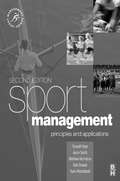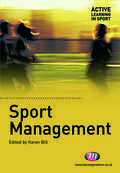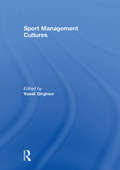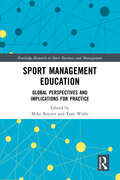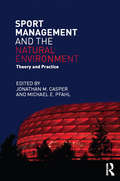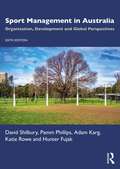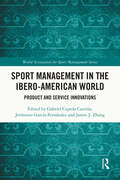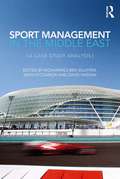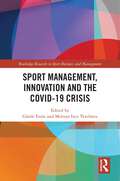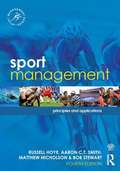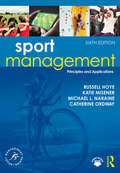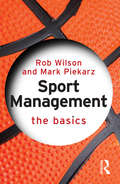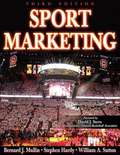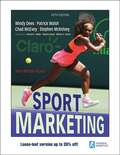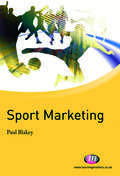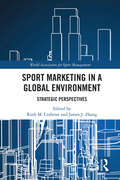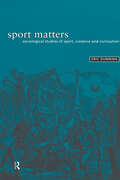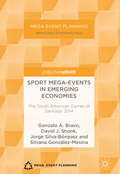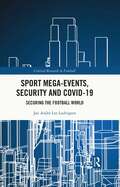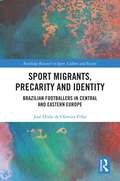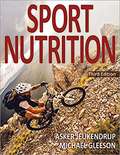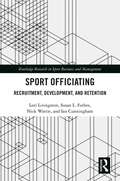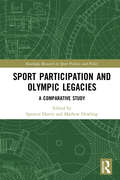- Table View
- List View
Sport Management
by Bob Stewart Aaron Smith Matthew Nicholson Russell Hoye Hans WesterbeekSport Management: principles and applications second edition provides a comprehensive introduction to the practical application of management principles within sport organisations. Ideal for all students studying sport management at an introductory level, it presents an international balanced view between accepted practice and what research evidence tells us about the application of a range of management principles and practices in sport. Structured in two parts it offers an introduction and explanation of the structure of the sport industry and covers the fundamental management issues unique to sport including: strategy, human resource management, leadership, finance, marketing, governance and performance management. Each chapter has a coherent learning structure complete with international case studies and accompanying online lecturer and student support material which: presents a conceptual overview of the focus for the chapter presents accepted practice supported by specific organisational examples at the community, state/provincial, national and professional level, these organisations will include examples specifically from the UK, Australia and New Zealand presents one big case for analysis per chapter, which is supported by online diagnostics and tutor resource materials presents research findings from around the globe presents a summary of guiding principles for the focus of the chapter based on a balanced view of practice and research presents a section of teaching and learning resources including a review questions, further reading, relevant websites provides online access to PowerPoints per chapter, tutorial activities per chapter and test bank of multiple choice questions for students per chapter This book combines clearly explained theory with a variety of pedagogical features that make it essential for students and teachers of sport management.
Sport Management (Active Learning in Sport Series)
by Karen BillThis is a core text for all those on Sport Management and Sports Studies courses. It examines both traditional business elements and the new functional areas of management in sport. Key chapters on marketing, finance, entrepreneurship, and event management are included, and the book as a whole provides a critical understanding of the complex and dynamic relationship between sport, business and management. The reader is supported through accessible theoretical explanation, real-life examples and case studies, learning activities and guidance on further study.
Sport Management Cultures
by Vassil GirginovThis is the first book to address the link between culture and sport management. The aim is to demonstrate that culture profoundly affects how we research, teach and practice sport management. The book engages with the concept of culture both as an abstract analytical category and specific beliefs and practices. It recognizes that a single best way of managing does not exist; that the applicability of management theories may stop at national boundaries; and that fundamental cultural values act as a strong determinant to managerial ideology and practice. Culture makes the study of sport management interesting because it challenges many taken-for-granted assumptions about management, yet it reinforces our belief in the existence of common management problems. The book offers a comprehensive review of the conceptualisations of culture and its relation with sport management by examining a range of issues: the emergence of multiculturalism as a policy issue; the impact of commonly shared cultural values within the fitness industry on managers and organisations behaviour; building cultural bridges in community sport organisations; cultural meanings attached to the consumption of Olympic merchandise, and culturally-informed interpretation through a reflective analysis of sport management texts. This book was published as a special issue of European Sport Management Quarterly.
Sport Management Education: Global Perspectives and Implications for Practice (Routledge Research in Sport Business and Management)
by Mike RaynerThis book examines a range of contemporary issues related to the global delivery of sport management education. At a time of unprecedented change in Higher Education, the book looks closely at how sport management education can and should deliver positive outcomes in sport business and management outside of the university. The book brings together sport management academics from around the globe and examines how their practice in education has been shaped by the cultural, religious, and political context of the national regions in which they work. It aims to identify core principles in sport management education and implementation, and discusses the key aspects of sport management programmes, from curriculum design and pedagogy to issues around unified accreditation and the needs of employers. It also focuses in on what sport management education might look like in an increasingly digital post-COVID world. This is essential reading for all sport management educators and anybody working in sport-related professions looking to understand global educational platforms and their implications for policy at local, regional, national, and international level.
Sport Management and the Natural Environment: Theory and Practice
by Jonathan M. Casper Michael E. PfahlWith climate change and other environmental issues becoming increasingly prominent, any successful sport organization now has to incorporate environmental concerns into their business strategy, while all sport managers must understand how to implement environmental initiatives into their everyday business. Sport Management and the Natural Environment is the first book to introduce environmental theory and best practice in the context of sport management, demonstrating how sport organizations can become more effective and sustainable, and exploring the important advocacy role that sport organizations have in local and global communities. It considers the unique social, economic and political space that sport occupies in society, and examines the most important practical managerial issues related to sport and the environment, including: Facilities Finance and accounting Leadership Marketing, communication and digital media Operations Stakeholder relations Strategic planning Including contributions from leading academics and practitioners, Sport Management and the Natural Environment is the perfect foundation text for any course touching on environmental issues or social responsibility in sport, and essential reading for any sport manager looking to improve their professional practice.
Sport Management in Australia: Organisation, Development and Global Perspectives
by Pamm Phillips David Shilbury Katie Rowe Adam Karg Hunter FujakThis is the only book to introduce the history, organisation, management and development of sport in Australia. Now in a fully revised and updated sixth edition, it is the perfect foundation text for anybody looking to understand the policies, processes and practices that help maintain Australia’s position as a powerhouse of global sport. This book outlines trends in participation, the role of government and private organisations, different models of delivering sporting services and the benefits and drawbacks of increasing commercialisation. Covering sport at all levels, from community sport to elite level, including mega-events such as the Olympics and Commonwealth Games, this sixth edition includes three brand-new chapters, looking at the sport workforce, innovative delivery models and sustainable sport. This book also considers the Australian system in a global context, drawing comparisons with other sporting systems around the world. Every chapter offers useful features, such as review questions, case studies and practical examples. Sport Management in Australia is an essential text for any sport management, sport policy or sport development course. This book is accompanied by PowerPoint slides and exam questions for each chapter.
Sport Management in the Ibero-American World: Product and Service Innovations (World Association for Sport Management Series)
by James J. Zhang Jerónimo García-Fernández Gabriel Cepeda CarriónThis book explores innovation in technology, products, and services in sport management in the Ibero-American region, one of the most rapidly developing regions in world sport. This timely volume captures a sense of the potential impact and opportunities presented in the region for international sport businesses and sporting organisations. The book presents cutting-edge research into topics as diverse as digitization in the Chilean sport industry; responses to COVID-19 by sports clubs in the region; consumer behavior in the Portuguese fitness industry; multiplatform content distribution in Brazilian basketball, and the strategy behind the growth and development of the Valencia marathon in Spain. It is full of insight, data, and examples of best practice in innovation. This is fascinating reading for any student, researcher, or practitioner working in sport management, sport business, sport governance, international business and management, or Ibero-American studies.
Sport Management in the Middle East: A Case Study Analysis
by Sean O'Connor David Hassan Mohammed Ben SulayemThe Middle East is one of the fastest growing and significant markets in world sport, as well as a powerful source of investment in sport. Bids for the Olympics in 2020 and the soccer World Cup in 2022, as well as remarkable investments in Formula One motor racing, horse racing and English Premier League soccer clubs, demonstrate the strength of interest, the depth of resource and the technical expertise maintained by sport business interests in the region. Sport Management in the Middle East is the first book to offer a serious and in-depth analysis of the business and management of sport in the region. Written by a team of world leading researchers in Middle Eastern sport, and illustrated in full colour throughout, the book examines the importance of sport in the Middle East and introduces its particular management processes, structures and cultures. As well as providing an overview of the region’s sporting strategy and key stakeholders, the book also offers a number of detailed case-studies of sport in individual Middle Eastern countries. A unique guide to sport management in a region of fundamental importance in world sport, this book is essential reading for any serious student or scholar of sport management, sport business, Middle East studies, or sport and society.
Sport Management, Innovation and the COVID-19 Crisis (Routledge Research in Sport Business and Management)
by Meltem Ince Yenilmez Gözde ErsözThis book looks at how sport and sports organisations have had to innovate during the COVID-19 pandemic. Against a backdrop of lockdowns, empty stadia and a fast-moving public health crisis, the book presents fascinating case studies of innovation and crisis management in sport, with valuable lessons to be learned for preparedness and resilience in future crises. The book explores how managerial processes have evolved during the pandemic in areas as diverse as sports communication, youth sport, sports events, esports, sports tourism, and physical activity, in both professional and community settings. It considers the fundamental importance of technology as a tool of innovation, and considers how different stakeholder groups, from governing bodies to athletes to fans, have developed new pathways of engagement and what that might mean for the future development of the sport industry. This book is fascinating reading for any student, researcher, practitioner or policy maker looking to better understand this profound moment in the history of sport and society, and to anybody with an interest in key themes in sport business and management, such as innovation, crisis management or consumer behaviour.
Sport Management: Principles and Applications
by Bob Stewart Matthew Nicholson Russell Hoye Aaron C.T. SmithNow available in a fully revised and updated fourth edition, Sport Management: Principles and Applications introduces the sport industry and examines the role of the state, non-profit and professional sectors in sport. It focuses on core management principles and their application in a sporting context, highlighting the unique challenges faced in a career in sport management. Written in an engaging and accessible style, each chapter has a clear structure designed to make key information and concepts simple to find and to utilize. Chapters contain a conceptual overview, references, further reading, links to important websites, study questions and up-to-date case studies from around the world to show how theory works in the real world, and a companion website offers additional activities for students and guidance notes and slides for instructors. The book covers every core functional area of management, including: strategic planning organizational culture organizational structures human resource management leadership governance financial management marketing performance management. This fourth edition also includes expanded coverage of sport media, change management and other contemporary management issues, providing a comprehensive introduction to the practical application of management principles within sport organizations. It is ideal for first and second year students on sport management related courses, as well as those studying business-focused or human movement courses seeking an overview of applied sport management principles.
Sport Management: Principles and Applications (Sport Management Series)
by Russell Hoye Katie Misener Catherine Ordway Michael L. NaraineNow available in a fully revised and updated sixth edition, Sport Management: Principles and Applications tells you everything you need to know about the contemporary sport industry. Covering both the professional and nonprofit sectors, and with more international material than any other introductory sport management textbook, it focuses on core management principles and their application in a sporting context, highlighting the unique challenges of a career in sport management. The book contains useful features throughout, including conceptual overviews, guides to further reading, links to important websites, study questions, and up-to-date case studies showing how theory works in the real world. It covers every core area of management, including: Strategic planning Human resource management Leadership and governance Marketing and sponsorship Sport and the media Sport policy Sport law The sixth edition includes expanded coverage of key contemporary issues, including integrity and corruption, digital business and technology, and legal issues and risk management. With useful ancillary material for instructors, including slides and case diagnostic exercises, this is an ideal textbook for first- and second-year students in sport management degree programs and for business students seeking an overview of applied sport management principles.
Sport Management: The Basics (The Basics)
by Rob Wilson Mark PiekarzSport Management: The Basics is an engaging and accessible introduction to sport management which considers a range of contemporary philosophical, social, cultural and political matters as they impact on this growing field. Drawing links between academic theory and practice, it explores the current challenges facing managers in the sport industry, addressing topics including: the history of sport management the role of the manager levels of management the public, private and voluntary sectors sport management in the global marketplace With suggestions for further reading throughout the text, a comprehensive chapter on employment and employability, and case studies which explore both theory and practice, Sport Management: The Basics offers a clear and concise introduction for anyone seeking to study or work in sport management.
Sport Marketing
by Bernard J. Mullin Stephen Hardy William A. Sutton Patrick Walsh Windy Dees Chad McEvoy Stephen McKelveySport marketing is more accessible than ever, with sport business professionals, companies, the media, athletes, teams, coaches, and fans connecting in new ways and with new experiences. Sport Marketing, Fifth Edition With HKPropel Access, presents a modernized, current-day approach to the dynamic industry of sport marketing. A full-color presentation brings this vibrant field to life with comprehensive coverage—balanced between theoretical and practical—to provide an understanding of the foundations of sport marketing and how to enhance the sport experience. <p><p> Building on the legacy that Bernard Mullin, Stephen Hardy, and William Sutton established in the first four editions, a new author team, handpicked by their predecessors, draw from their modern experience in the field to add a fresh perspective to this essential text. They bring the sport industry directly to the reader through extensive industry examples, interviews of top sports executives, challenging case studies, and global perspectives from teams, leagues, and other agencies around the world. Reflecting the evolving landscape of sport marketing, the text will prepare students to stay on the leading edge with the following updates: <p>• A focus on current and emerging technologies and how they have revolutionized the sport industry—ranging from mobile video streaming and fantasy sports to artificial intelligence and virtual reality <p>• Greater emphasis on data and analytics to make more informed business decisions <p>• In-depth examination of how social media and digital platforms serve as critical communication channels to drive sport marketing strategy and execution <p>• New content on target marketing, including understanding millennial sports fans and engaging with Generation Z <p>• Updated coverage of sales processes, addressing both traditional methods and new strategies for the mobile age <p>• Discussion of modern ticketing practices and the secondary ticket market, including how leagues partner with secondary ticket providers and the impact on pricing strategies <p><p> Also new to the fifth edition are related online learning aids, now delivered through HKPropel, designed to engage students and test comprehension of the material. Exclusive video interviews with sport industry leaders offer insights into how they incorporate marketing strategies into their daily work. Discussion questions and activities for each chapter guide students to apply core concepts, and web search activities provide opportunities for students to compare strategies found on sport organization websites and other online locations. <p><p> In addition, chapter objectives, an opening scenario, sidebars highlighting key concepts, and Wrap-Up, Activities, and Your Marketing Plan sections at the ends of chapters offer students additional learning tools as they explore how fans, players, coaches, the media, and companies interact to drive the sport industry. <p><p> With Sport Marketing, Fifth Edition With HKPropel Access, students will develop valuable marketing skills and prepare for a successful career in the competitive world of sport marketing.
Sport Marketing (Active Learning In Sport Ser.)
by Paul BlakeyThis is a highly accessible text that provides detailed coverage of the key concepts, ideas, principles and techniques of sport marketing. It combines clear and concise explanations with applied case studies, supported by clear objectives, learning activities and points for reflection. UK-based examples are used throughout and the book successfully combines both theory and practice. The field of sport marketing is an exciting and fast-moving part of the sports industry that presents new challenges requiring innovative and effective solutions. Engagement with sport marketing therefore equips students with valuable transferable skills necessary for all sport managers of the future.
Sport Marketing in a Global Environment: Strategic Perspectives (World Association for Sport Management Series)
by James J. Zhang Ruth M. CrabtreeThis book examines contemporary sport marketing, with a particular focus on strategic marketing, the process of longer-term planning and development that involves identifying the needs and wants of potential customers and satisfying their needs through the exchange of products and services. It presents cutting-edge case studies from around the world, including from the United States, China, Europe, the Middle East, South America, and Africa. It considers some of the most interesting emerging themes and topics in contemporary sport business, including fitness marketing, the role of sustainability in sport marketing, social media and digital marketing, athlete-brand relationships, and the promotion and development of collegiate and scholastic sport. As a whole, this volume presents a snapshot of the opportunities and challenges facing sport marketers around the world. Sport Marketing in a Global Environment is fascinating reading for any advanced student, researcher, or professional working in sport business and management, sport development, marketing, strategic management, or global business.
Sport Matters: Sociological Studies of Sport, Violence and Civilisation
by Eric Dunning1999 North American Society for the Sociology of Sport Annual Book Award Sport Matters offers a comprehensive introduction to the study of modern sport from a sociological perspective. It covers such topics as the history of sport, the development of ideas of 'fair play', sport and the emotions, the professionalization of sport, race-relations and sport and sport and gender.Unique in its cross-cultural analysis, it uses examples from around the globe, including sports spectator violence in North America, the growth of international soccer and the role of sport in the European identity.
Sport Mega-Events in Emerging Economies: The South American Games of Santiago 2014 (Mega Event Planning)
by Gonzalo A. Bravo David J. Shonk Jorge Silva-Bórquez Silvana González-MesinaChile and the South American Games of Santiago 2014 offers an interesting case to examine an event of sizeable magnitude in a country with little history of hosting sport mega-events (SMEs). This case study will expand the readers understanding of third-order SMEs like the South American Games and highlight the circumstances under which they occur. It also contributes to advance and challenge our knowledge as to what extent previous findings made on impact, legacies, justifications, and challenges identified on larger scale SMEs hosted in the developed world, inform the process and outcomes of second or third-order SMEs organized in less developed countries. This monograph is suitable for scholars and practitioners who want to expand their knowledge on sport event planning outside the rim of the global north. It is an essential read for scholars and graduate students in policy studies, sociology, international business, sport and event management, and tourism and hospitality. Likewise, it is an important resource for event planners, government officials, event rights holders, and sport destination marketers involved with the planning of sport mega-events across the world.
Sport Mega-Events, Security and COVID-19: Securing the Football World (Critical Research in Football)
by Jan Andre LudvigsenThis book examines contemporary issues of security at sports mega-events (SMEs). It focuses on the 2020 UEFA European Football Championship (Euro 2020) - subsequently postponed to 2021 - the third biggest SME in the global sporting calendar and a unique multi-city, multi-country event that took place in the eye of the COVID-19 storm. Drawing on stakeholder interviews, policy documents, media sources and existing research, the book explores the constructions, meanings, and perceptions of security in the efforts to secure this football mega-event. It argues that Euro 2020 is a powerful case through which to better understand wider security governance and security-related processes in present-day societies, which are increasingly preoccupied with notions of ‘security’, ‘safety’ and ‘risk’. It assesses the precautionary logic and transnational knowledge transfer processes that guide security constructions surrounding SMEs in an uncertain and threat-conscious world, and captures the dramatic moments in which COVID-19 transitioned into a security threat with severe impacts on the world of football and well beyond. Sport Mega-Events, Security and COVID-19 advances existing debates in the sociology of football and sport, offering a critical understanding of security and safety in the modern world, and giving an insight into the changing ‘new normalities’ of security between 9/11 and the COVID-19 pandemic through the lens of global sport. This is a fascinating reading for anybody with a professional or academic interest in sport management, event management, football, security studies, policing, risk and crisis management, the sociology of sport, the sociology of surveillance, or political science.
Sport Migrants, Precarity and Identity: Brazilian Footballers in Central and Eastern Europe (Routledge Research in Sport, Culture and Society)
by José Hildo de Oliveira FilhoThis book takes a close look at the experiences of migrant athletes, their precarious careers, and at what this can tell us about wider themes of globalisation, identity, race, gender, and the body.Based on in-depth ethnographic research on male Brazilian footballers and futsal players working in Central and Eastern Europe, this book helps to fill gaps in previous research on sports migration and global sports labor markets. This book uses life-history interviews to reveal how race, gender, and class are articulated in the everyday experiences of migrant athletes; how they express their religious affiliations; and how they navigate the relationships with injuries and pain that are characteristic of precarious athletic careers. This book considers the transnational networks that are essential in sustaining international athletic labor flows and the role that borders and emotions play in the lives of sports migrants and also the agency that migrant athletes can have in issues such as player development and retention.Presenting a more nuanced, ground-level perspective on sports migration and the sociological dialogue between identity, culture, and the body, this book is fascinating reading for anybody with an interest in the socio-cultural study of sport, migration, globalization, or global inequalities.
Sport Nutrition
by Michael Gleeson Asker Jeukendrup<p>Sport Nutrition, Third Edition, presents the principles and rationale for current nutrition guidelines for athletes. Using a physiological basis, this text provides an in-depth look at the science behind sport nutrition. Students will come away with an understanding of nutrition as it relates to sport and the influence of nutrition on performance, training, and recovery. <p>This text is organized with the student in mind, with content sequenced in a logical order that puts building blocks in place to facilitate greater comprehension as more advanced topics are introduced. The book moves from general principles of nutrition and nutrient requirements to estimating and fulfilling energy needs with the appropriate combinations of macronutrients and micronutrients. Supplements are addressed from a scientific standpoint, followed by the influence of nutrition on training adaptations, immune function, body composition, weight management, and eating disorders. The new chapter on personalized nutrition covers periodized nutrition, gender differences, and special populations (young athletes, older athletes, and diabetic athletes) and offers practical examples from specific sports. </p>
Sport Nutrition for Coaches
by Leslie BonciSport Nutrition for Coaches is a complete resource for coaches looking to ensure that athletes achieve optimal performance through proper nutrition. <p><p>In its practical and easy-to-understand format, this text supplies coaches, personal trainers, and fitness specialists with a wide range of information, including balancing nutrients, monitoring supplement use, and dealing with disordered eating. This book also contains several planning tools that can help readers to put the information and strategies to use. As one of only two nutrition books on the market geared toward coaches, this is a valuable resource for people working with athletes.
Sport Officiating: Recruitment, Development, and Retention (Routledge Research in Sport Business and Management)
by Nick Wattie Ian Cunningham Lori Livingston Susan L. ForbesSport officials are tasked with maintaining order and adjudicating sport contests. Given their multifaceted role in enforcing rules, standardizing competitions, and keeping sport safe for all participants, they are a requisite part of the sport workforce. With ongoing reports of annual attrition rates in officiating in excess of 20-35% for various sports around the world, there is more than ample evidence that officiating dropout is a persistent, pervasive, and global challenge underpinned by multiple contributing factors including, but not limited to, the threat of verbal and physical abuse. Moreover, despite worldwide recognition and growing interest in the problem, there has not been a comprehensive resource for sport scientists and practitioners studying or working to reverse the ongoing trend. Sport Officiating: Recruitment, Development, and Retention provides a ‘state of the science’ summary in the emerging area of inquiry limited to sport officiating recruitment, development, and retention, and, provides insight and evidence-based approaches to the development of successful officiating development programs (ODP). This book is a primary reference work using a multifaceted, holistic, and evidence-based approach to integrate key findings from the sport science literature to date in suggesting and providing real-world solutions to the practical issues faced by sport organizers. Sport Officiating: Recruitment, Development, and Retention is a key resource for researchers interested in the development of sport officials and for sport practitioners aiming to implement officiating development programs (ODP) at any level within sport systems.
Sport Operations Management and Development: An Applied Approach
by Mark PiekarzThis essential textbook introduces the work of sport management and sport development from the perspective of the day-to-day operational challenges faced by managers and sport development officers. It addresses the practicalities of designing and delivering sport services safely, efficiently and effectively, for profit or in non-profit contexts. The book covers core topics such as time management, project management, customer care, developing partnerships, fundraising, crisis management and research. It adopts a problem-based learning approach, with a strong, practical focus on putting theory into practice, to illustrate good practice and to help the reader develop sound operational skills, knowledge and decision-making, underpinned by the principles of safety, effectiveness and efficiency. It features a range of diverse international case studies, covering different sports and operational management challenges, including global pandemics and terrorism. Connecting theories, ideas and scientific disciplines, the book helps managers approach operations management more creatively, combining both management and development work to show areas of difference and overlap. It also introduces systems theory and the principals of marginal gains or small wins, to help managers develop working cultures which can be utilised in all areas of management, encouraging a culture of learning, reflection and ethical action. Sport Operations Management and Development is designed for both practitioners and students working in sport management, development, coaching or aspects of sport science.
Sport Participation and Olympic Legacies: A Comparative Study (Routledge Research in Sport Politics and Policy)
by Spencer Harris; Mathew DowlingThis book examines claims that the Olympic Games are a vehicle to inspire and increase mass sport participation. It focuses on the mass sport participation legacy of the most recent hosts of the summer Olympics, including Atlanta, Sydney, Athens, Beijing, London, Rio, and Tokyo. It is organised by host city/country and applies an analytical framework to each, addressing the socio-political context that shapes sport policy, the key changes in sport policy, the structure and governance of community sport, the Olympic and Paralympic legacy, and the changes in mass sport participation before, during, and after the Games. The book is important reading for students, researchers, and policymakers working in sport governance, sport development or management, and the sport policy sector.
